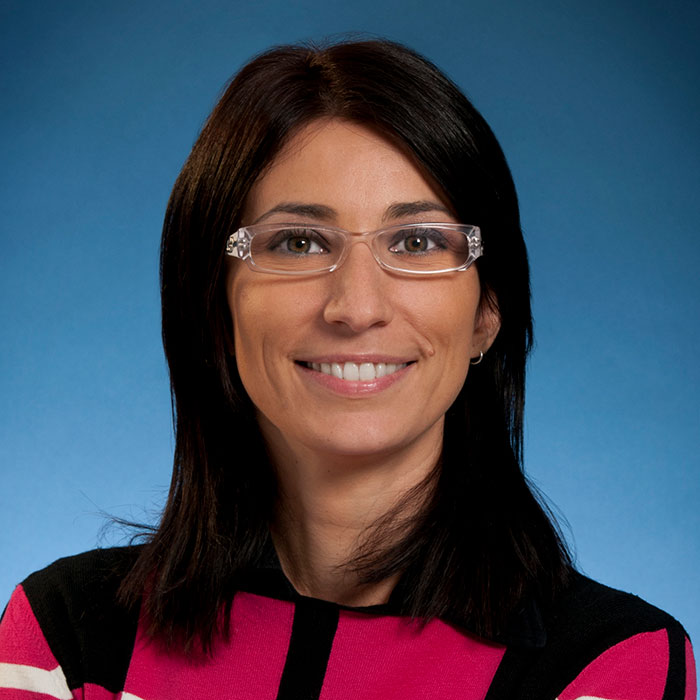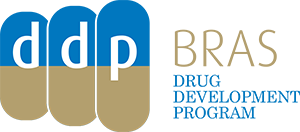
BRAS DDP Clinical Fellow 2012 – 2016
Anna was born in the Lake Como region of Italy, and at 18 she moved to Milan. It was there that she obtained her medical degree, and completed her medical oncology training. She then moved to Denver, Colorado to pursue her PhD in drug development and *translational research. Anna then applied to the Princess Margaret Cancer Centre in Toronto, for a fellowship position, at the BRAS drug Development Program. When we sat down in October of 2013, it was the beginning of Anna’s second year.
Why The Princess Margaret?
“Princess Margaret is one of the most internationally recognized cancer centres in the world, with a solid drug development program, led by *Dr. Siu, who I had the opportunity to meet before I came here. Her work and her dedication have been so inspiring.”
Why did you take up medicine?
“I love science. I am not necessarily interested in a perfect science, and medicine is very well balanced between science, and human feelings, and relationships with people. This has motivated me to pursue this career.”
Why Oncology?
“That is a tough question. Science and molecular biology, have always been my interest. When I started medical school, I realized there was still a lot to be learned regarding the biology of cancer. In addition, I also experienced the reality of cancer in my family, and the combination of both led me to this field.”
Is it unusual to have a clinical setting and a research setting under one roof?
“In my country, it is very difficult to work properly in the clinic and pursue research. Despite the hard work, and dedication, unfortunately the economic situation, and the lack of resources, limit the ability to be productive in the research setting. That is why, even if you work hard, sometimes you cannot accomplish what you can do here. This institution provides invaluable opportunities to merge clinical and research activities.”
You heard about The Princess Margaret in Italy?
“Definitely. In the Medical Oncology field, Princess Margaret is known as one of the top Cancer Centres. It is very well recognized international.”
In the Medical Oncology field, Princess Margaret is known as one of the top Cancer Centres.
What is your role as a Fellow at the BRAS Drug Development Program?
“I came here mainly to concentrate in drug development and most of my time has been dedicated to this area, both in terms of seeing new patients in the clinic, as well as following them throughout their daily/ weekly treatment. Clinically, I have the opportunity to work in the melanoma field, where there is a lot of exciting research, given that several new drugs not available a few years ago, are now routinely used. In addition, I am also gaining experience in the GI field, following this clinic once a week.
Most recently, I’ve been working with Dr. Siu in the Head and Neck clinic. Aside from the clinical experience, this fellowship provides the opportunity to be productive in the research setting. Our mentors make sure all of the Fellows have one, two or even more projects to develop, follow and complete, during our time at the Bras Drug Development Program at Princess Margaret.
The research projects may vary based on the fellow’s interest. As for me, I love pre-clinical research, and everything that is related to molecular biology. As a part of the molecular profiling team, I had the opportunity to develop a research protocol, aimed to perform a deep sequencing analysis of the tumour tissues of patients. The main endpoint of all these studies, is to better understand the molecular characteristics of each patient tumour, and hopefully provide the most appropriate and personalized treatment.”
Who are your mentors at the BRAS Drug Development Program?
“Although in the BRAS DDP I have been working with all staff – Drs. Siu, Bedard and Razak, my mentor is Dr. Lillian Siu.”
What do you think are some of the major advances we have had the last few years in cancer research?
“There is lots of them! Melanoma is the perfect example to prove that translational research has changed dramatically in the treatment, and management of patients affected by this disease. A few years ago, patients with advanced melanoma, had very limited treatment options, with unfortunately very frustrating unequivocal decisions, that involved either chemotherapy or symptoms management only. Nowadays, given the availability of several new therapies, and clinical trial options, medical oncologists are faced with treatment decisions that have become more and more difficult. They require deeper analysis, and extensive multidisciplinary discussions. The availability of several treatment options is sometimes quite overwhelming for patients, who ask physicians what it the best choice, the best therapy? There is not always a straightforward answer.”
Define ‘cure’.
“A lot of patients ask us this question – if cancer can be cured. I say to patients, that although sometimes it is not possible to eradicate the cancer, I do believe that ‘cure’ could be achievable, to live a good quality of life, despite the disease. If we can do this, then we have accomplished a lot.”
I say to patients, that although sometimes it is not possible to eradicate the cancer, I do believe that ‘cure’ could be achievable, to live a good quality of life, despite the disease. If we can do this, then we have accomplished a lot.
What inspires you?
“What inspires me is what has been accomplished so far. All these amazing cancer discoveries, as well as the need we still have for all the patients out there. That’s the motivation. Human beings can be inspiring, and science can as well. The combination of both, is so exciting and fascinating, that’s it is difficult not to pursue this road.”
You have enthusiasm and a passion for your job.
“There are a lot of Fellows here at Princess Margaret. Most of them come from difference places of the world. If this is not driven by passion, then it’s hard to know what else it can be. It takes a lot of effort to leave your country; your family, your comfort zone, and sometimes your good life, and adjust to a completely different environment. I definitely believe all of us have a great passion for what we do.”
Are you going back to Italy after your two years are up?
“I am not sure if I am going back to Italy. Of course my family is there, so it is tempting. But I know my family is happy if I am happy with the work, and the place I live in. I am looking for a position, which doesn’t necessarily have to be at home. I think it has to be where I’ll be happy and comfortable. I am happy and comfortable here as well. So we will see.”
How do you like Toronto?
“Toronto is great! I am in love with big cities, and Toronto offers lots of things to do. It has a dynamic environment. Milan is so much like that. There is a little bit of Europe here that I’ve missed for so many years, while I was in the United States.”
What makes the Princess Margaret Cancer Centre and the BRAS Drug Development Program one of the top five in the world?
“Top places are made by great people who are really dedicated. I don’t think this can be only a career, rather something you truly believe in. So it is your passion, correct? There is a lot of motivation and inspiration here, and throughout the years, the Princess Margaret and the Bras Drug Development Program have gained international recognition, which has made it a great
place to learn and grow.”
Thank you Anna.
Maggie Bras
* Translational research, is scientific research, which focuses on areas that can be translated into the clinic, which can have practical/helpful application. In our
case, this can be meaningful for the patients.
* Dr. Lillian Siu, is the Director of the Phase 1 Clinical Trials Program, and a Co-Director of the BRAS Drug Development Program.
